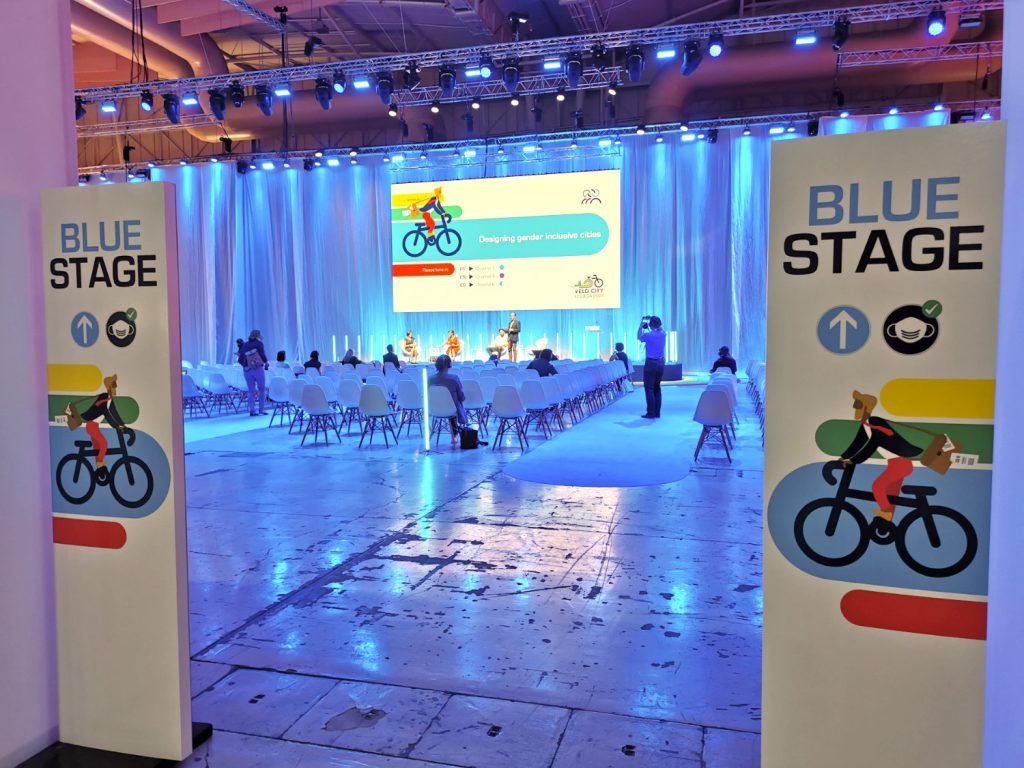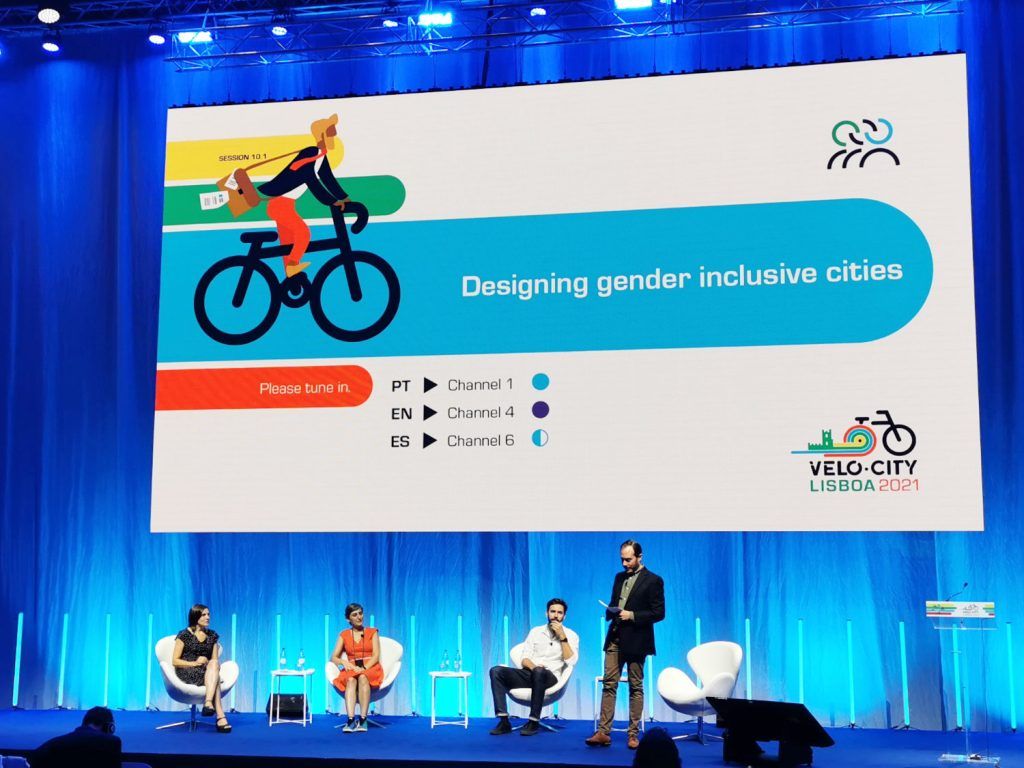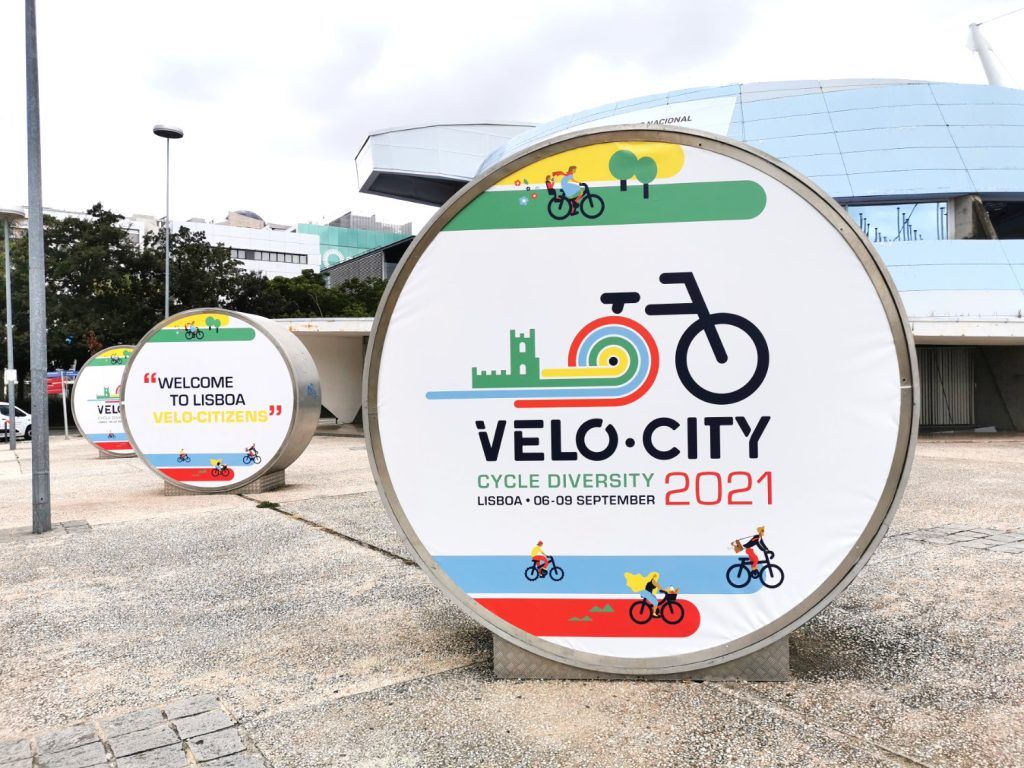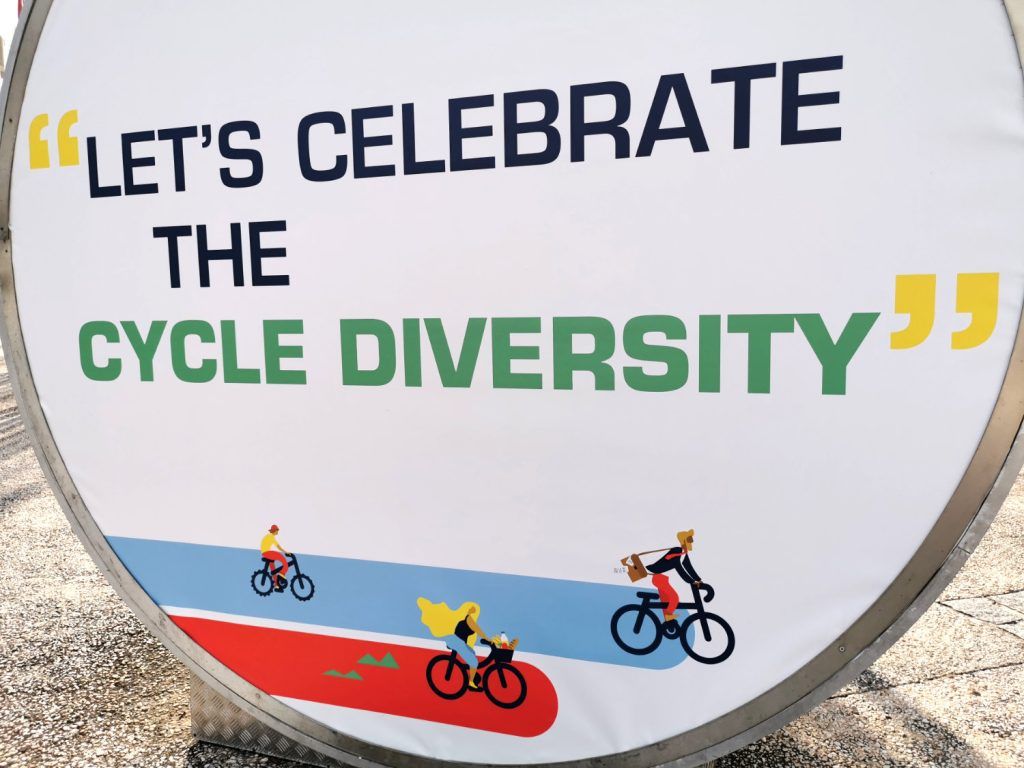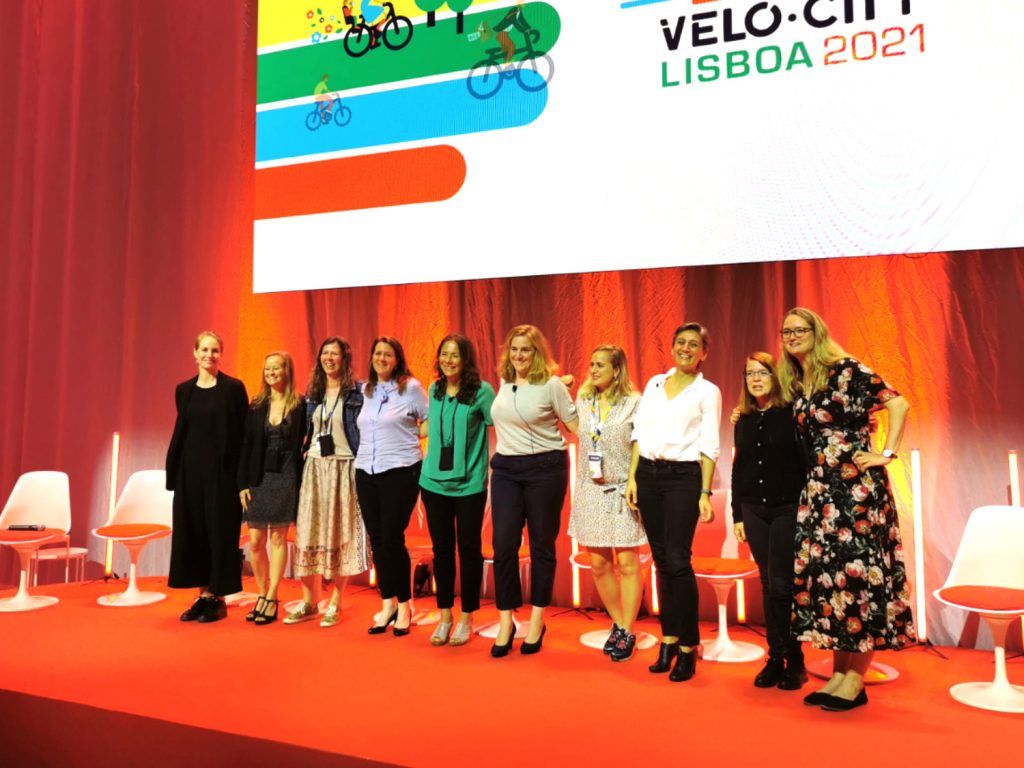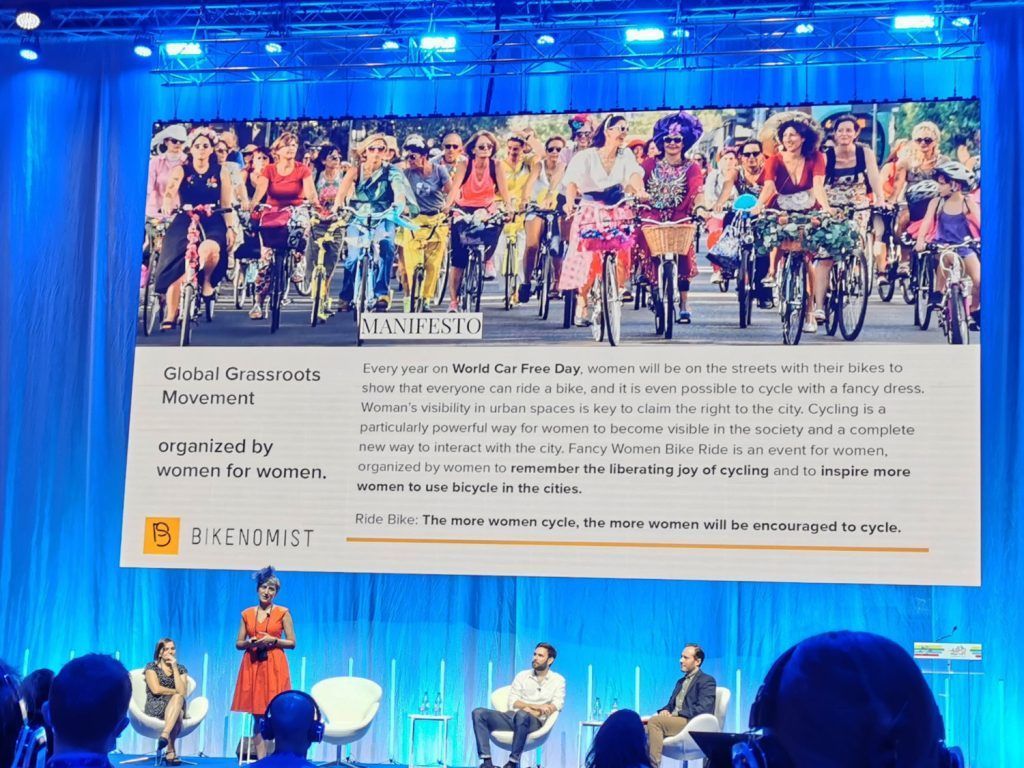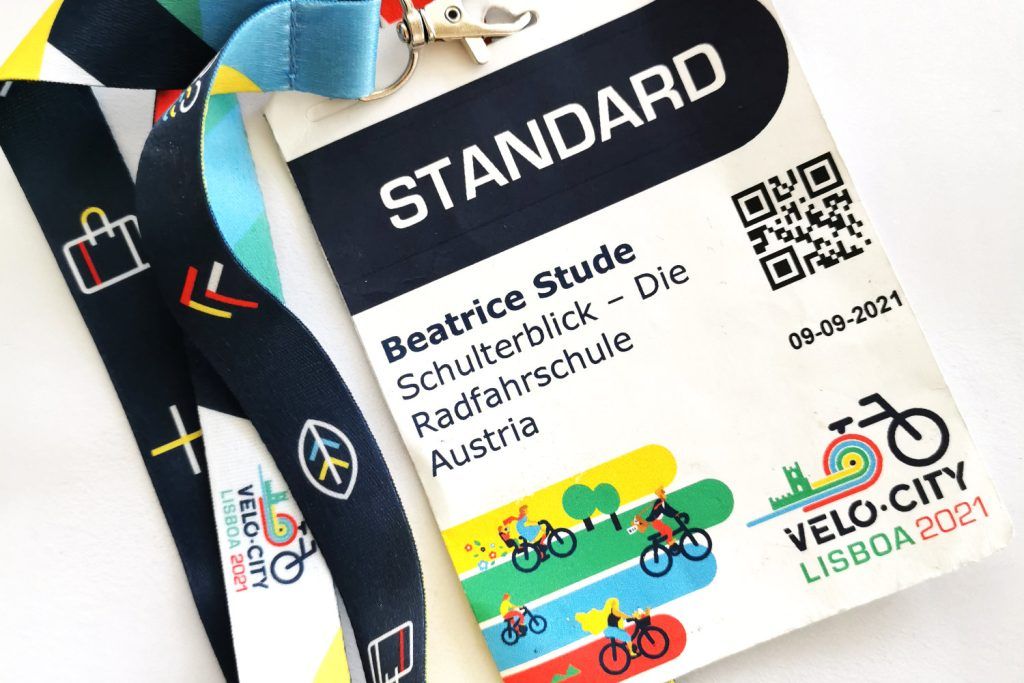Gender equality: Velo-City, the world’s leading conference on cycling, took place in Lisbon in September 2021. A few impressions of how inclusive it felt to be there and thoughts on how it could be more welcoming.
Finally meeting in person again was a pleasure. It was inspiring to hear about diverse projects on how to improve the conditions for cycling and how to promote cycling around the world. But, so it seemed to me, roughly half the population is not seen as half the humanpower to push cycling as a sustainable mode of transportation and to contribute to save our world for future generations: Women and non-binary people – it is often the details that matter to welcome diversity.
Cycling Diversity needs diverse hosts
“Oh, finally a conference without hostesses!“
a participant and her colleague had hoped for. Well. Young skinny women in brightly coloured dresses, matching the branding of this year’s conference, were greeting the participants and soon became a popular photo motif. What message do these pictures convey about the world leading conference on cycling? Women, chosen according to their physical appearances, whose only job is to look nice and smile into the cameras – they are saying: Women are pretty decoration. A colourful framework for male participants in particular.
If only there were a balance of gender identities among the hosts – this would just be a question of taste. And if these hosts additionally covered the different ethnicities of people living in Lisbon, this would propel the message of diversity to even higher levels – the motto of the conference.
Women are successful in business
Women work in companies or run their own, all around the world. But this year’s Velo-City conference logo tells a different story: One woman cycles with groceries on a dutch bike. Another woman cycles with her kid, which sprinkles flowers – their ride seems to be for leisure, also on a dutch bike. There is nothing wrong with dutch bikes.
The man on the conference logo leads a group of four, all on their bikes. So fast that he loses documents out of the business bag hanging around his shoulders. The man, = the successful guy – that is also how the men, with whom I talked at the conference, interpret the logo. This imagery does not fit the motto »Cycle Diversity«, it reproduces and manifests traditional allocations of stereotypical roles – today, in the 21st century, where all people should be treated equally.
The different types of people riding their bikes on the logo assigned with one of four colours are used to label the different stages: The main stage is blue and has the speedy dashing businessman. During the session »Gender-inclusive Cities« the moderator stated at the beginning: “Cities are designed by men for men: basically men riding to work, riding to doing business. Transport for men is essential, for women it is somehow leisure. …“ the men on the racing bike was perfectly matching this introduction. The dashing businessman on the racing bike substantiates these introductory words. Visuals have an impact on our brain just as much as language.
Wow! This time three lovely men pitch!
„Wow! This time we have three lovely men pitching on stage!“ – Have you ever heard of men being introduced on stage like that? No? Me neither. It was three women who were introduced this way. The three women who had already won against their fellow competitors with their projects. Three women who had been selected by the jury to be in the finals to present their product or service to the audience at Velo-city.
This was the new format of the cycle industry at Velo-City: The winning product or service is to be implemented by the City of Lisbon. The audience applauded and chose the winner. But the opening words still lingered in the air: They imply that women are not a matter of fact in the bicycle industry and that they are only the presenters but not the entrepreneurs behind it.
“Now, three passionate entrepreneurs, who made it into the finals, are pitching their products and services!“,
that would have been an appropriate introduction. Just ask yourself before you introduce someone: Would I introduce this person like that if it had another gender? If the answer is no, think again.
Just my impression?
On the last day, I spoke at the »Not Another Gender Session« about these irritations I had during the conference. I had not planned to go, but I met the organisers of the session during the coffee break: We chatted and they invited me to join them. After the session, some of the women came to me and thanked me for speaking up. One of the entrepreneurs that had made it to the finals confirmed my irritation – she felt irritated to be introduced like that.
What can we do about that? After I listed and shortly explained my three examples why this Velo-City conference had not been gender-sensitive and inclusive, I suggested to establish an Advisory Board to accompany the next Velo-city conference.
The essence of the »Not another gender session« was that the system needs to change. Yes. But it is also in the details, which impact whether participants feel welcome, appreciated and as a part of the community – or not.
We need to stop talking about half the population, as if women were an exceptional phenomenon in the cycling industry – in the negative sense of the word. Women need to be invited and need to be appreciated as equals.
All seems to stem from the same source: biased old binary concepts of roles, who do not correlate with currently lived realities any longer. They do not vanish over night, they need to be pointed out, reflected and addressed each time they pop up.
It is that, what you value, what you care about and take time to critically reflect to make it better: More open and more diverse. If we want diversity, we need diverse members on boards, on panels, in planning and organising. This was my third Velo-city conference as a speaker. I am looking forward to continue to contribute in the future.
This article appeared in the Community Blog on »Freitag – Die Wochenzeitung« at the beginning of March 2022.
More information
- Velo-City Lisbon
- ECF – European Cyclists’ Federation
- 2023 Velo-City Leipzig – for FreiRad
- 2021 Velo-City Lisboa – for Schulterblick – The Cycling School
- 2015 Velo-City Nantes – for Radlobby Austria
- 2013 Velo-City Vienna – for Radlobby Austria
